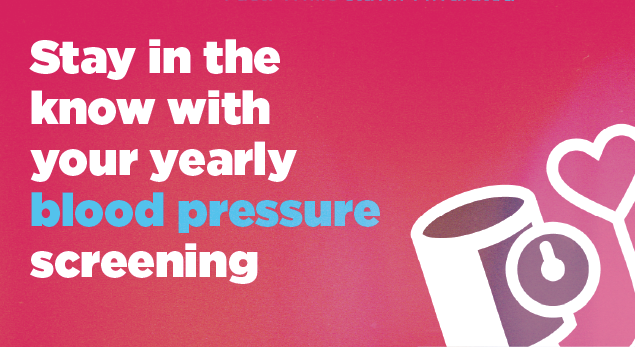Stay in the know with your yearly blood pressure screening
May 14, 2025

High blood pressure (hypertension) is one of the most common health issues Evergreen patients face. Because it usually doesn’t have any symptoms, high blood pressure is known as a “silent killer” that can lead to deadly issues like heart attack or stroke when it goes undetected.
Luckily, there’s plenty you can do to lower your risk of high blood pressure. One of the easiest steps you can take is to be sure to go to your annual wellness visit, where your primary care provider will check your blood pressure. If your screening shows that you have high blood pressure, your provider will help you manage it with medication and/or lifestyle changes.
May is High Blood Pressure Education Month, so let’s learn a few quick facts about blood pressure! You probably know that you can lower your risk of high blood pressure with healthy habits like:
- eating a healthy diet that’s low in sodium (ask our on-staff registered dietician)
- getting 30 minutes of exercise a day
- cutting down on alcohol and smoking
- doing activities that lower your stress (try yoga, Reiki or chair massage at the THRIVE Wellness Center)
When it comes to high blood pressure, there’s also plenty of myths and misconceptions — read on to find out the facts!
Myth: Hypertension only affects older adults.
Fact: While your risk of hypertension increases with age, it can affect people of all ages, including young adults. Early detection is key to prevent long-term complications like stroke and heart attack.
Myth: I don’t have high blood pressure since I don’t have any symptoms.
Fact: Hypertension is often called the “silent killer” because it usually has no noticeable symptoms. The only way to know if you have high blood pressure is to get it checked regularly.
Myth: If I’m overweight, hypertension is inevitable.
Fact: While being overweight increases your risk, eating well, exercising, and managing stress can help keep your blood pressure in check.
Myth: Hypertension can’t be managed without medication.
Fact: While medication can be necessary for some people, lifestyle changes like a healthy diet, regular exercise, reducing salt intake, and stress management can significantly lower blood pressure, sometimes eliminating the need for medication.
Myth: I’m not at risk for hypertension since it doesn’t run in my family.
Fact: While genetics can play a role, lifestyle factors like diet, physical activity, and stress management are key in preventing and managing high blood pressure, regardless of your family history.
Myth: If I have high blood pressure, I’ll always feel sick.
Fact: High blood pressure often doesn’t cause any symptoms until it causes serious damage. Regular monitoring is important, even if you’re feeling fine.
Myth: Drinking a lot of water can lower your blood pressure.
Fact: While staying hydrated is important for your health, water isn’t a treatment for high blood pressure. You can manage hypertension with healthy habits and, when needed, medication.